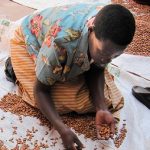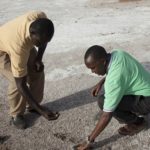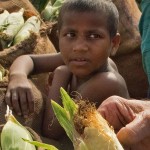The food price crisis of 2007–2008 threatened global food security. The access of households to quality and nutritious food was especially at risk due to their diminished purchasing power. In an effort to assist the United Nations (UN) Secretary-General and the UN High-Level Task Force (HLTF) on the Global Food Security Crisis, GIZ supported IFPRI in delivering relevant information and cutting-edge analyses on food and nutrition policy actions.
Germany (Federal Ministry for Economic Cooperation and Development)
Germany prioritizes rural development and food security in its international development agenda. For almost two decades, the support of German partners—including the Federal Ministry for Economic Cooperation and Development (BMZ), Deutsche Gesellschaft für Internationale Zusammenarbeit (GIZ), several German universities such as the Center for Development Research (ZEF) at the University of Bonn, and the nongovernmental organization Welthungerhilfe—have been instrumental in IFPRI’s work in poverty alleviation, land degradation, climate change, improving health and nutrition, and developing and reporting on the Global Hunger Index. These partnerships continue to produce evidence-based research, driven by their aligned priorities to ensure sustainable food production and healthy food systems.
This brochure highlights some of the key research between IFPRI and Germany.
The Global Hunger Index
To rank countries and illustrate trends in hunger worldwide, IFPRI, Concern Worldwide, and Welthungerhilfe developed the Global Hunger Index (GHI), which captures four indicators of hunger: undernourishment, child wasting, child stunting, and child mortality. Using data from the Food and Agriculture Organization of the United Nations (FAO), the World Health Organization (WHO), and UNICEF, the index ranks countries on a 100-point scale, with 0 being the best score (no hunger) and 100 being the worst. The GHI is updated annually to track progress. By highlighting this information, the index serves as a tool for mobilizing political will and promoting effective policies to combat hunger. For more than a decade, the GHI has helped to increase country accountability in order to reduce hunger and undernutrition.
Tracking Hunger and Strengthening Resilience: An IFPRI-Germany Partnership towards Sustainable Development
IFPRI has been partnering with German development agencies, universities, and nongovernmental organizations (NGOs) for more than three decades to build the evidence base needed to effectively tackle pressing development issues.
Highlights of Recent IFPRI Research and Partnerships with Germany
This brochure highlights key research collaborations between IFPRI and German institutions in recent years. For more than three decades, the International Food Policy Research Institute (IFPRI) has engaged in strong partnerships with German development agencies, universities, and nongovernmental organizations (NGOs) to build the evidence base needed to effectively tackle pressing development issues. Initially, IFPRI and >> Read more
World Soil Day: Advancing Soil Health through Research
December 5 marks World Soil Day. Through its cutting-edge research, IFPRI has been informing policies and strategies that protect the soil for the benefit of the billions of people who depend on it.
GHI: A Decade of Promoting Action against Hunger and Malnutrition
2016 will mark 11 years of the Global Hunger Index (GHI). For more than a decade, the GHI has contributed to increasing accountability to improving hunger and malnutrition at the global, regional, and national levels.





